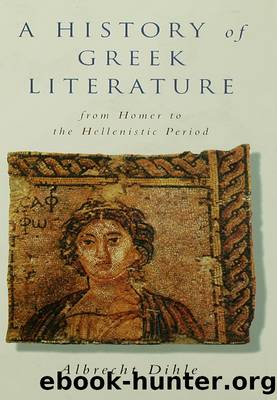A History of Greek Literature by Albrecht Dihle

Author:Albrecht Dihle
Language: eng
Format: epub
ISBN: 978-1-134-67977-5
Publisher: Routledge
Part III
CLASSICAL LITERATURE OF THE FOURTH CENTURY BC
11
SOCRATES AND SOCRATIC THOUGHT
In general and literary history alike, the fourth century BC stands out clearly as an era with a character all its own. The demise of Athens in 404 left Greece with an unstable system and a succession of short-lived power groups, none of which (e.g. Sparta or Thebes) was able to hold its position for long or prevent other cities (Athens or Corinth) from rising to power in their turn. The beneficiaries of this political vacuum were the Persian Empire and other states on the periphery of the Greek-speaking world, where enterprising monarchs set up new kinds of territorial state, disregarding political notions of the classical polis, but drawing on the rational administrative and military achievements of the Greek city-state.
These rulers included the tyrant Dionysius of Syracuse, who was able for a brief period to unite the Italian Sicilian region settled by Greeks, the Pherae dynasty which built up a modern state out of the backward agrarian region of Thessaly, and indigenous dynasties on Cyprus and Caria in Asia Minor where modern states loosely dependent on the Persian Empire were likewise set up with the aid of Greek experts.
Pre-eminent among these states was Macedonia, which rose in the course of the fourth century BC to great-power status under a long-Hellenised royal house, taking the Greek mini-states into its thrall on the battlefield of Chaeronea in 338 BC and, sustained by a Greekspeaking world now united under an iron rule, went on to conquer the entire Orient and open it up to the Greek language and civilisation for a full millennium. Greek history in its own right, and the fourth century BC as a historical era, thus extend to the Battle of Chaeronea, or at most to the Alexandrian campaign of conquest.
The apparent weakness of the ancient Greek states in this period was reflected in social and political unrest. Hardly any other era witnessed so many revolutions. Part of the population was constantly in exile in a neighbouring state, waiting for a fresh coup attempt. The roots of this outward powerlessness and internal strife lay in the fact that the prevailing political ideas and institutions and social agenda were out of step with the economic potential of the age. Despite the dismal picture painted by its history at government level, this was in fact an era of steady economic expansion. It saw, for example, rapid recovery from the economic setbacks of repeated warfare, Athens being particularly sorely tried in this respect. Given the poverty of the country in terms of natural resources, the credit for this goes both to the trading and commercial enterprise of the inhabitants, and above all to the fact that they had learned how to combat economic problems with extensive organisational and fiscal policy measures.
The most reliable indicator of this steadily rising prosperity in the teeth of political catastrophe was an enormous population explosion, which on the other hand compelled Greece to offload its surplus population onto surrounding countries, given its own limited territory.
Download
This site does not store any files on its server. We only index and link to content provided by other sites. Please contact the content providers to delete copyright contents if any and email us, we'll remove relevant links or contents immediately.
| Ancient & Classical | Arthurian Romance |
| Beat Generation | Feminist |
| Gothic & Romantic | LGBT |
| Medieval | Modern |
| Modernism | Postmodernism |
| Renaissance | Shakespeare |
| Surrealism | Victorian |
4 3 2 1: A Novel by Paul Auster(11047)
The handmaid's tale by Margaret Atwood(6852)
Giovanni's Room by James Baldwin(5877)
Big Magic: Creative Living Beyond Fear by Elizabeth Gilbert(4723)
Asking the Right Questions: A Guide to Critical Thinking by M. Neil Browne & Stuart M. Keeley(4574)
On Writing A Memoir of the Craft by Stephen King(4213)
Ego Is the Enemy by Ryan Holiday(3991)
Ken Follett - World without end by Ken Follett(3972)
The Body: A Guide for Occupants by Bill Bryson(3799)
Bluets by Maggie Nelson(3709)
Adulting by Kelly Williams Brown(3669)
Guilty Pleasures by Laurell K Hamilton(3586)
Eat That Frog! by Brian Tracy(3513)
White Noise - A Novel by Don DeLillo(3434)
The Poetry of Pablo Neruda by Pablo Neruda(3366)
Alive: The Story of the Andes Survivors by Piers Paul Read(3310)
The Bookshop by Penelope Fitzgerald(3225)
The Book of Joy by Dalai Lama(3217)
Fingerprints of the Gods by Graham Hancock(3211)
